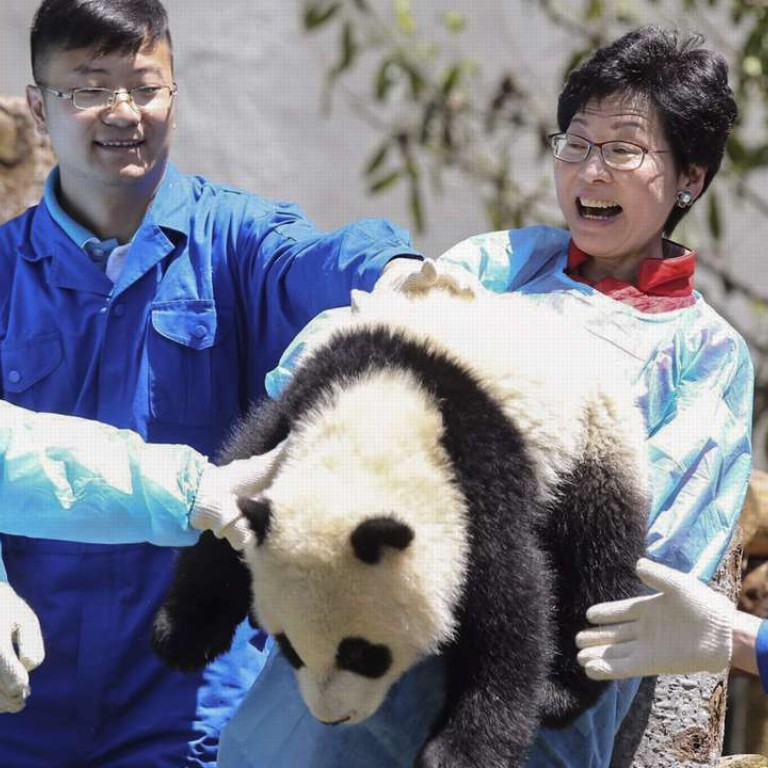
New mainland panda park free for Hongkongers as show of gratitude for city’s support after Sichuan earthquake
Hong Kong’s HK$10 billion donation towards Sichuan’s reconstruction efforts not forgotten as park opens in Wolong National Nature Reserve
A panda park and a highway funded by the Hong Kong government in Wolong opened on Wednesday, breathing new life into the area devastated by the Sichuan earthquake of 2008 – and, in a show of gratitude, the park will be free for visiting Hongkongers.
As Sichuan marks the eighth anniversary of the magnitude 8 earthquake that killed more than 80,000 people on May 12, 2008, Chief Secretary Carrie Lam Cheng Yuet-ngor officiated at the opening ceremonies of the two major projects underwritten by the Hong Kong government.
One of them was the opening of a giant panda park at the Wolong National Nature Reserve, which was destroyed in 2008 as it was just 30km from the quake’s epicentre. A Wolong official announced that the 90-yuan admission fee for the new park and another one in Dujiangyan city would be free for Hong Kong residents to show gratitude for their generosity.
“The reconstruction of Wolong means a lot to Hong Kong,” Lam said. “After the handover, the country has given two pairs of giant pandas to Hong Kong. They are An An and Jia Jia, Le Le and Ying Ying.
“That makes Hong Kong the only place outside of the mainland to have more than two pandas. Over that time, the pandas have brought so much happiness to Hong Kong people.”
Lam then hugged some pandas at the new park.
A beaming Lam entered the panda enclosure and introduced one of them as Bing Bing, the great granddaughter of Jia Jia, who is a star attraction at Hong Kong’s Ocean Park.
Jason Wong Chun Tat, general manager at Hong Kong travel agency Hong Thai Travel welcomed the ticket waiver for the city’s residents. He said visiting pandas had always been one of the highlights of his agency’s package tours to Sichuan, and it might consider adding one more day to visit the new park.
After the earthquake hit Wenchuan county in 2008, toppling schools, houses and hospitals, Hong Kong donated a total of HK$10 billion for reconstruction work, of which HK$9 billion came from the government and the rest from the Jockey Club and public donations.
Of the amount donated by the government, HK$1.58 billion was spent on 23 projects at the Wolong reserve, including the new panda park there. The Post, through its charity project, Homes for Hope, raised HK$16.1 million to rebuild 980 homes for 2,432 people and provide essential services for two of the hardest hit areas in Sichuan, Mianzhu and Jiuzhaigou.
Eight years after the earthquake, Wolong has moved on. Toppled houses have been rebuilt. More importantly, the people there are smiling again.
“My house is right there. It was not collapsed but many others around here were reduced to rubble,” an old man at the panda park ceremony said, as he pointed to his house that is just a few minutes of walk away from the panda park.

“All the houses have been rebuilt and the people have moved on. For some time after the quake hit, we needed to climb over the mountains to get to Chengdu. Now we don’t,” he added.
Yesterday, Carrie Lam also officiated at the opening ceremony of the 45km section of the road connecting Wolong and Yingxiu town, which is located at the epicentre of the quake.
The mega road project consists of 12 bridges and seven tunnels. The total cost is about 1.97 billion yuan and the Hong Kong government has contributed 770 million yuan.
A construction worker who has been working at the project for a few months said it was a dangerous environment to work in because it was dark inside the tunnels. The slopes are also steep along the tunnel.
“I have been working around the clock here from 7am to 10pm every day. It was a tough job,” he said. But as demanding as the job may sound, he has no regret because what he has been doing is to help Sichuan move on from the shadow of the 2008 quake.
Additional reporting by Nikki Sun and Shirley Zhao

